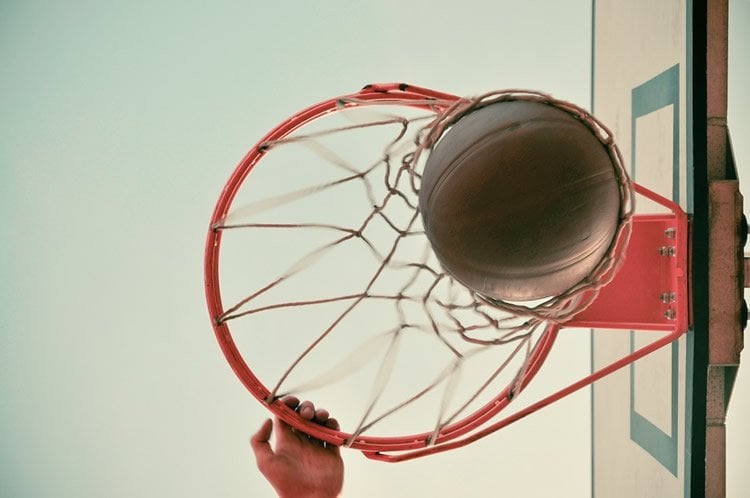Summary: Researchers report NBA players who are more skilled than their peers early in their careers remain more skilled as they age. Additionally, they have a slower decline in their performance after the peak of their careers.
Source: Springer.
NBA players who excelled during the first part of their career were able to retain more of their skill as they aged. They also displayed a slower decline in performance after the peak of their career, according to a study published in the Springer journal Behaviour Research Methods.
Dr Nemanja Vaci and colleagues at the University of Oxford used data collected by the NBA to assess the interaction between aging and the development and deterioration of basketball skills in professional players. The authors analysed data from a total of 2,845 players over 50 years. This included player demographics and performance level variables, such as positions played in the game, minutes of game play, players’ contribution to team wins and how efficient a player was. The authors found early career development to be an important factor in the rate of skill decline after a player’s career peak.
Dr Nemanja Vaci, corresponding author of the study, said: “Interestingly, our results challenge a large body of evidence that demonstrates that age is not kinder to more able, active, or knowledgeable people. One explanation for these findings is that once the decline in physical performance begins, more knowledgeable or more able players may utilize knowledge (i.e. motoric and context specific information) from earlier in their career to help effectively preserve their performance while ageing.”
Dr Vaci added: “However, it is probable that other factors, such as physical ability, personality, motivation, or even genetic makeup, which may enable certain players to acquire knowledge and skill more quickly, may also affect this correlation.”

The researchers found that a player’s position on the court did not affect their rate of skill decline. However, those who played more minutes per game had a greater increase in performance during the first part of their career and slower decline in performance with age.
Dr Vaci said: “Studying the changes that occur as people age is challenging for a number of reasons, including the immense time scale that needs to be captured. Fortunately, this study was able to use a dataset where players have taken part in an activity throughout their lives, and a vast amount of data has been systematically recorded. This allowed us to investigate age-related changes in greater detail. The flexibility and general nature of the model created in this study makes it a perfect candidate for use across other studies of changes throughout the lifespan.”
Source: Lucy Eccles – Springer
Publisher: Organized by NeuroscienceNews.com.
Image Source: NeuroscienceNews.com image is in the public domain.
Original Research: Open access research for “Large data and Bayesian modeling—aging curves of NBA players” by Nemanja Vaci, Dijana Cocić, Bartosz Gula, and Merim Bilalić in Behavior Research Methods. Published January 25 2019.
doi:10.3758/s13428-018-1183-8
[cbtabs][cbtab title=”MLA”]Springer”NBA Players Who Shine Early Stay Skilled for Longer.” NeuroscienceNews. NeuroscienceNews, 28 January 2019.
<https://neurosciencenews.com/basketball-skill-10649/>.[/cbtab][cbtab title=”APA”]Springer(2019, January 28). NBA Players Who Shine Early Stay Skilled for Longer. NeuroscienceNews. Retrieved January 28, 2019 from https://neurosciencenews.com/basketball-skill-10649/[/cbtab][cbtab title=”Chicago”]Springer”NBA Players Who Shine Early Stay Skilled for Longer.” https://neurosciencenews.com/basketball-skill-10649/ (accessed January 28, 2019).[/cbtab][/cbtabs]
Abstract
Large data and Bayesian modeling—aging curves of NBA players
Researchers interested in changes that occur as people age are faced with a number of methodological problems, starting with the immense time scale they are trying to capture, which renders laboratory experiments useless and longitudinal studies rather rare. Fortunately, some people take part in particular activities and pastimes throughout their lives, and often these activities are systematically recorded. In this study, we use the wealth of data collected by the National Basketball Association to describe the aging curves of elite basketball players. We have developed a new approach rooted in the Bayesian tradition in order to understand the factors behind the development and deterioration of a complex motor skill. The new model uses Bayesian structural modeling to extract two latent factors, those of development and aging. The interaction of these factors provides insight into the rates of development and deterioration of skill over the course of a player’s life. We show, for example, that elite athletes have different levels of decline in the later stages of their career, which is dependent on their skill acquisition phase. The model goes beyond description of the aging function, in that it can accommodate the aging curves of subgroups (e.g., different positions played in the game), as well as other relevant factors (e.g., the number of minutes on court per game) that might play a role in skill changes. The flexibility and general nature of the new model make it a perfect candidate for use across different domains in lifespan psychology.






